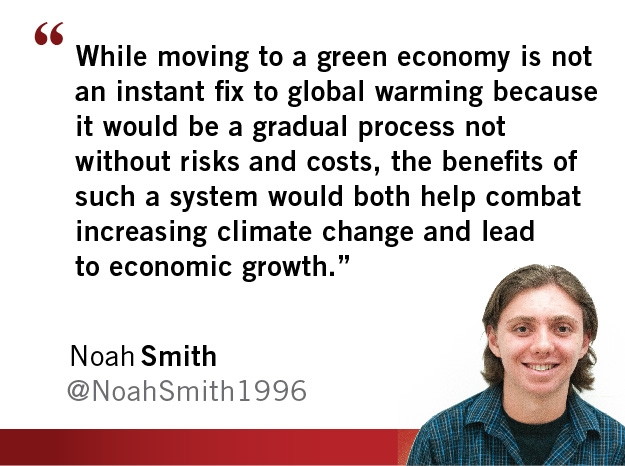Climate change is upon us, ladies and gentlemen, whether you believe that it is man-made or not. Icebergs are melting, the global temperature is increasing and greenhouse gases are eating away at the ozone. While it is clear that people must reduce their greenhouse-gas emissions, experts wonder at what expense it comes to the economy.
Is it possible and realistic to reduce our dependence on fossil fuels without completely destroying the economy?
Based on recent studies that involve the U.S., slowly transitioning to a greener economy focused on improving green investment, increasing the quantity and quality of jobs in green jobs and ensuring global environmental benefits can help reduce pollution while strengthening the economy at the same time. While moving to a green economy is not an instant fix to global warming because it would be a gradual process not without risks and costs, the benefits of such a system would both help combat increasing climate change and lead to economic growth.

The benefits of a green economy are apparent and clear. For one, green jobs are more reachable to workers without a college degree. According to the Economy Policy Institute, for every 1 percent increase in green intensity in a given industry, there was corresponding .28 percentage-point increase in the share of jobs in the industry held by workers without a four-year college degree. The same study indicates that manufacturing jobs account for 20.4 percent of all green jobs, meaning a transition to a green economy could potentially help America begin to retain much needed manufacturing jobs.
As a result, transitioning to a green economy opens up the labor market by making jobs drastically more accessible to workers without college degrees. For a sluggish economy that reported disappointing employment figures just last month, a green economy could lead to a steady increase of jobs over the next decades. In fact, it is estimated that the current number of 2.3 million jobs in renewable energy is expected to grow to 20 million by 2030.
Companies would also profit immensely from making the transition toward the green economy; some are already showing successful results that demonstrate benefits in real life results. For example, a Chinese company, Zhangzidao Fishery Group, saw revenues grow 40 percent in five years by offering an alternative to monoculture methods that provided a more balanced ecosystem to its fisheries. Even companies outside of agriculture, like General Motors, saved more than $30 million in six years through its resource productivity program, where the company reduced waste by 40 percent, according to GlobeScan.
Despite all the benefits, actually initiating a transition to a more focused green economy could prove challenging. These solutions may not be affordable. There is also the potential risk of developed countries and companies exploiting the green economy model in order to promote commercial interests to the World Trade Organization. While these fears are logical, governments should take steps toward a transition to a green economy in a gradual way in order to address and evaluate all risks as they appear. The best step forward right now would be as simple as initiating a cap and trade law as suggested by Paul Krugman.
Any step forward at this point would be one in the right direction as we run out of time to fix this current climate crisis.
Reach the columnist at ndsmit12@asu.edu or follow @noahsmith1996 on Twitter.
Like The State Press on Facebook and follow @statepress on Twitter.
Editor’s note: The opinions presented in this column are the author’s and do not imply any endorsement from The State Press or its editors.
Want to join the conversation? Send an email to opiniondesk.statepress@gmail.com. Keep letters under 300 words and be sure to include your university affiliation. Anonymity will not be granted.




